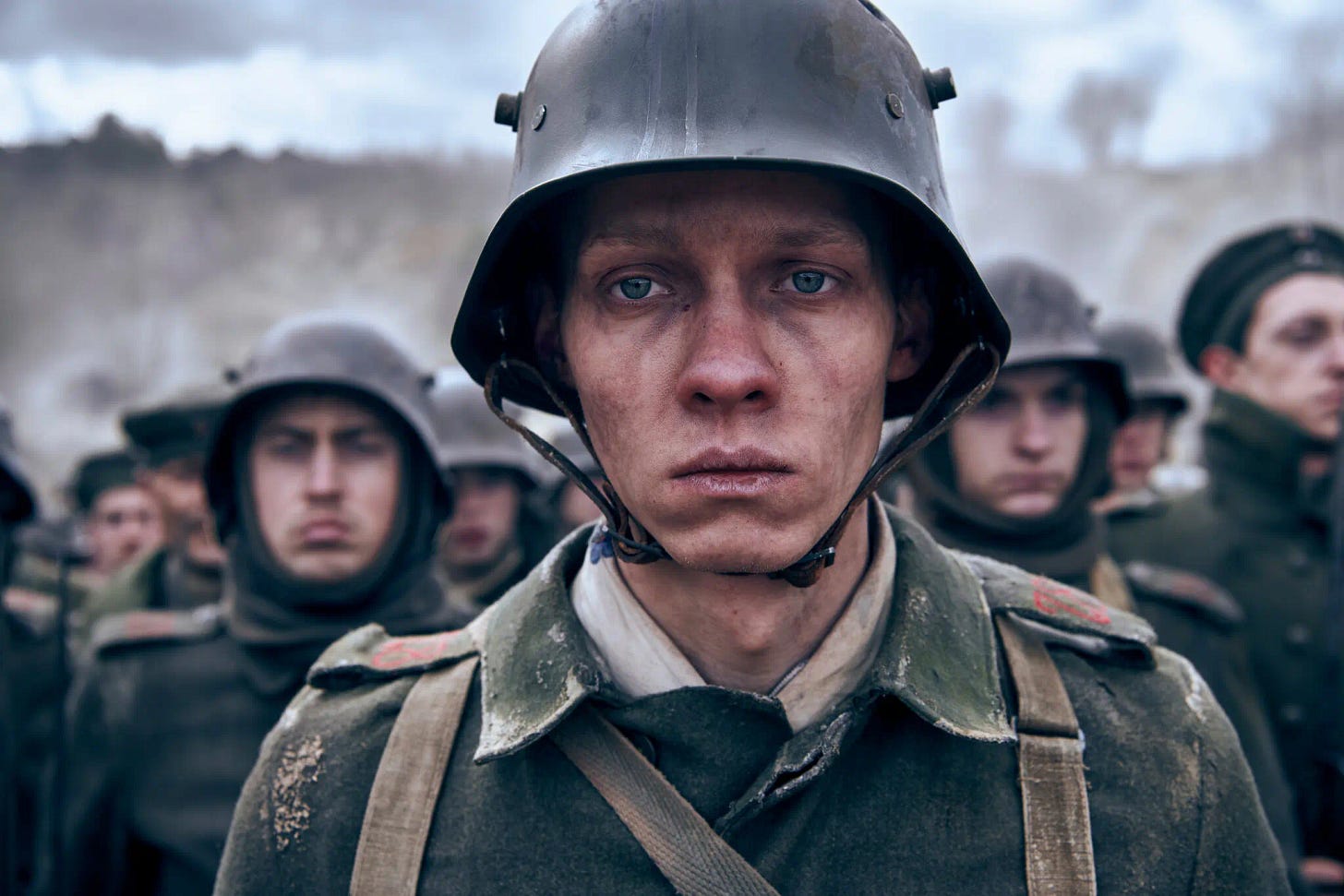The Forever Wars and "All Quiet on the Western Front"
Lessons from the greatest anti-war novel ever written.
I read All Quiet on the Western Front for the first time when I was fourteen.
I had studied the First World War, as everyone did, in history class. I knew about the assassination of Franz Ferdinand, the rise of nationalism, territorial conflicts in the Balkans, and the complex web of alliances that would drag each nation, one by one, into the ugliest war the world had ever seen. My own country has been at war in some fashion for most of my life, with such ruthless persistence that Americans have a phrase for this state of being. We call them the Forever Wars. The Devil works hard, but the military-industrial complex works harder.
Still, our geographical distance from conflict zones means that most of us live far from the hideous realities of war, whether the unhinged decimation of Gaza or the ceaseless fighting in Ukraine. Erich Maria Remarque’s novel is a window into a world I have never experienced.
As I write this, the United States appears to be on the brink of the next gruesome chapter in the Forever Wars, and I find myself thinking a great deal about World War I. From the beginning of All Quiet on the Western Front, Remarque sets the tone in the novel’s epigraph:
This book is to be neither an accusation nor a confession, and least of all an adventure, for death is not an adventure to those who stand face to face with it. I will try simply to tell of a generation of men who, even though they may have escaped shells, were destroyed by the war.1
What follows is the tale of the German soldier Paul Bäumer and his comrades, whose experiences are based on Remarque’s military service during WWI. In 1928, the novel was serialized in Vossische Zeitung before publication in book form the following year. Remarque swiftly found great success and notoriety, so much so that he had to flee Germany after the Nazis took power. His anti-war message struck a nerve.
There is no glamor, no Hollywood heroism in All Quiet. The characters we meet are young men who were initially fooled by jingoistic fervor, and instead find themselves locked in a meat-grinder, fighting against other men who have done nothing to them in service of a cause from which they will not benefit. As the soldiers discuss after the Kaiser visits their camp:
“Then what exactly is the war for?” asks Tjaden.
Kat shrugs his shoulders. “There must be some people to whom the war is useful.”
“Well, I’m not one of them,” grins Tjaden.
“Not you, nor anybody else here.”
“Who are they then?” persists Tjaden. “It isn’t any use to the Kaiser either. He has everything he can want already.”
“I’m not so sure about that,” contradicts Kat, “he has not had a war up till now. And every full-grown emperor requires at least one war, otherwise he would not become famous. You look in your school books.”
“And generals too,” adds Detering, “they become famous through war.”
“Even more famous than emperors,” adds Kat.
“There are other people back behind there who profit by war, that’s certain,” growls Detering.
“I think it is more of a kind of fever,” says Albert. “No one in particular wants it, and then all at once there it is. We didn’t want the war, the others say the same thing—and yet half the world is in it all the same.”2
In a battle scene shortly after, a French soldier falls into Paul’s trench, and without hesitation, Paul stabs him. The man dies a slow, wretched death. Paul gives him water, presses the man’s wounds, attempts to make him comfortable. The man dies.
“But you were only an idea to me before, an abstraction that lived in my mind and called forth its appropriate response. It was that abstraction I stabbed. But now, for the first time, I see you are a man like me. I thought of your hand-grenades, of your bayonet, of your rifle; now I see your wife and your face and our fellowship. Forgive me, comrade. We always see it too late.”3
Paul finds the man’s name in his pocket-book shortly after. Gérard Duval, compositor.
One by one, Paul’s friends perish. When the war ends, there will be statues and speeches and poppy pins. But the true lesson of Paul’s story is the arbitrariness of each death. This is, after all, why the book stirred such controversy: Remarque’s characters die in service of ruling elites whose territorial goals stand only to enrich themselves, and confer only devastation and horrors for those on the front lines.
World War I was history’s first “modern” war, with new technology from machine guns and tanks to airplanes and mustard gas, resulting in a conflict of unfettered brutality. The men who fought the battles, the women who fought to keep the wounded alive—they emerged as the Lost Generation, any romanticization of warfare shell-shocked from a quivering corpse.
Today, the people of my country possess an innate cynicism towards international conflict. Our “leaders” are mere servants of special interest groups. They lied to us to get us into Iraq—why not do the same with Iran? More soldiers dead, more spiraling debt, and time goes marching on.
Paul and his comrades knew the truth. They weren’t dying for family, for honor, or for glory.
They died for the bloodlust of earthly kings. They died face-down in the dirt.
Recently in The Crossroads Gazette:
Erich Maria Remarque, All Quiet on the Western Front, translated by A. W. Wheen (Ballatine Books, 1987, v.
Remarque, All Quiet on the Western Front, 205-206.
Remarque, All Quiet on the Western Front, 223.








Truly, in my opinion, one of the greatest books ever written. It has ripped my heart out every time I’ve read it—and you are correct that its message is still hauntingly relevant.
I read this when I was in 5th grade and remember how deeply affected I was by it. I don't think I
had read anything prior which had such an emotional impact on me. One of the things that stuck with me was how this was a story about an "enemy" and how I could easily identify with him. It wasn't an assigned reading, I came across it as a paperback I found that had an interesting cover. I had no idea going in what it would be about.
There are so many books which have influenced and affected me, I read all the time, and I can't imagine who I would be if they had never been read, and yet it seems kids are not reading much at all any more. There will be consequences to that we don't realize yet.